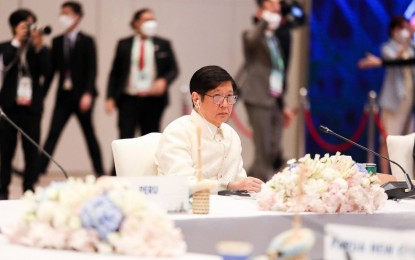
President Ferdinand R. Marcos Jr. during the 29th Asia-Pacific Economic Cooperation (APEC) Leaders Meeting in Thailand (PNA file photo)
MANILA – A House leader on Friday lauded President Ferdinand R. Marcos Jr. for highlighting the need for public-private partnerships (PPPs) in the country’s economic recovery, as the House of Representatives targets to pass a measure strengthening the PPP scheme before it adjourns on Dec. 17.
House Ways and Means Chair Joey Salceda expressed gratitude to the President for boosting PPPs as a national priority during the 29th Asia-Pacific Economic Cooperation (APEC) Leaders Meeting in Thailand.
In his remarks, Marcos said that strengthening the partnerships between the government and the private sector is the “centerpiece” of the Philippines’ economic transformation bid.
"The innovation, flexibility, expertise, experience, and access to capital of the private sector should combine with the exclusive resources and powers of the State to produce better public goods for the people. President Marcos is also correct to say that PPPs should extend towards healthcare, food security, and other social needs other than infrastructure," Salceda said.
The solon said that with the enactment of the new PPP Law, it will become enshrined in national policy to deliver social services through a “healthy mix of PPPs and government-funded programs.”
“This is a priority of the House leadership. There was consensus in the House committee, and we are working with the DOF (Department of Finance), the PPP Center, and other agencies to iron out the details," he said.
The House Committee on Public Works on Highways approved the substitute bill that would strengthen PPPs which is a legislative priority of President Marcos as mentioned in his first State of the Nation Address.
The bill's key features include the institutionalization of PPP pipeline projects; clearer approval thresholds for national and local PPPs; and the implementation of Generic Preferred Risk Allocation Matrix (GPRAM), which would make government PPP contracts more fiscally sound while also reducing litigation and contingent liabilities.
It also proposes the creation of a PPP pre-qualification, bids and awards committee; clearer rules for solicited proposals; negotiation after single complying bid; stronger fiscal safeguards in unsolicited projects; rules for competing unsolicited proposals; institutionalization of comparative “Swiss” challenge; and clearer rules on joint ventures.
Salceda said he has recommended standby implementing rules and regulations (IRR) based on the emerging bill so that it would not take "very long" from enactment to issue the IRR.
He emphasized that a delay in IRR issuance will hamper crucial investments.
"There are at leads 26 provisions in the draft workshopped by the executive agencies which requires further elaboration by the IRR. Having draft IRRs already discussed among agencies based on the emerging bill will save a lot of time," he said.
He said that settling disagreements among government stakeholders now on how to implement the law later on will also minimize confusion.
“The private sector values a rules-based order when it comes to investments. It reduces risks, levels the playing field, and narrows the room for corruption. That’s why just as we need the law urgently, we also have to get the implementing rules right," he said.
During the Asia-Pacific Economic Cooperation (APEC) CEO Summit in Bangkok, Thailand on Thursday, Marcos said public and private sectors must work together to develop more infrastructure, energy and agriculture projects to empower and strengthen the economy.
Meanwhile, Marcos, in a meeting with Thai conglomerate CP Group on Wednesday, said his administration seeks partnerships with the private sector, admitting that his government cannot transform the Philippine economy alone.
Marcos’ meeting with CP Group bore fruit after Thailand’s biggest private firm pledged to make additional investments in the Philippines in aquaculture, rice, and swine production.
For his part, Speaker Martin Romualdez said President Marcos "did very well" in his initial outing at the APEC Summit, earning the respect and admiration of the business leaders in the region.
“I think the President does very well in this fora, in these types of fora where there are exchanges, and in his insights into the conditionality in the Philippines whether it be economic or even political,” he said.
Romualdez added that former President Gloria Macapagal Arroyo (GMA), who was part of the delegation of President Marcos, was obviously satisfied with the performance of the Chief Executive.
“You could see GMA there literally cheering him on and we would see how delighted she was with his performance and the crowd itself was applauding our President for his very, very clear cut answers, and very incisive,” Romualdez said. (PNA)
